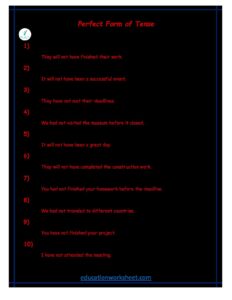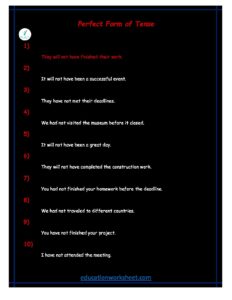how to converting Perfect Tense positive sentences to interrogative form
how to converting Perfect Tense positive sentences to interrogative form
Introduction to Perfect Tenses
Perfect tenses are used to describe actions that are, were, or will be completed before a specified point in time. The three primary perfect tenses in English are:
- Present Perfect: This tense is used to express actions that happened at an unspecified time in the past or have relevance in the present. It is formed by using “have” (or “has” for third-person singular) and the past participle of the main verb.
Example of a positive sentence in the present perfect tense:

- “I have visited Paris.”
- Past Perfect (Pluperfect): This tense is used to describe actions that were completed before another action or a specific point in the past. It is formed by using “had” and the past participle of the main verb.
Example of a positive sentence in the past perfect tense:
- “She had finished her homework before dinner.”
- Future Perfect: This tense is used to talk about actions that will be completed before a specified point in the future. It is formed by using “will have” (or “shall have” in some cases) and the past participle of the main verb.
Example of a positive sentence in the future perfect tense:
- “They will have completed their project by next week.”
Converting Positive Perfect Tense Sentences to Interrogative Form

To convert perfect tense positive sentences into interrogative form, follow these general guidelines:
- Identify the Perfect Tense: Determine which perfect tense (present perfect, past perfect, or future perfect) the original sentence is in. This will guide the transformation.
- Start with the Appropriate Auxiliary Verb: In English, questions are typically formed by starting the sentence with an auxiliary verb. The choice of auxiliary verb depends on the original sentence’s tense:
- Present Perfect: “Have” or “Has”
- Past Perfect: “Had”
- Future Perfect: “Will have” or “Shall have”
- Invert the Subject and Auxiliary Verb: Place the auxiliary verb before the subject, effectively inverting their order.
- Include the Main Verb: Follow the inverted subject-auxiliary order with the main verb. Make sure the main verb agrees with the subject in terms of tense and subject-verb agreement.
- Add the Question Mark: End the sentence with a question mark to indicate that it is an interrogative sentence.
Present Perfect Tense
Positive Sentence:
- “I have visited Paris.”
Interrogative Transformation:
- “Have I visited Paris?”
Past Perfect Tense (Pluperfect)
Positive Sentence:
- “She had finished her homework before dinner.”
Interrogative Transformation:
- “Had she finished her homework before dinner?”
Future Perfect Tense
Positive Sentence:
- “They will have completed their project by next week.”
Interrogative Transformation:
- “Will they have completed their project by next week?”
Key Points to Remember
- Always start interrogative sentences with the appropriate auxiliary verb for the tense used in the original sentence.
- Be careful with subject-verb agreement when forming the interrogative question.
- Use question words like “what,” “where,” “when,” “why,” “how,” etc., as needed to seek specific information in your question.
- If the original sentence contains a contraction, such as “I’ve” (I have) or “you’ve” (you have), expand it to the full form when forming the interrogative question. For example: “I’ve visited Paris” becomes “Have I visited Paris?”
Examples for Practice
Let’s practice converting positive sentences in each perfect tense to interrogative questions:
Present Perfect:
- Positive: “She has read the book.” Interrogative: “Has she read the book?”
- Positive: “We’ve traveled to many countries.” Interrogative: “Have we traveled to many countries?”
Past Perfect (Pluperfect):
- Positive: “He had already left when I arrived.” Interrogative: “Had he already left when I arrived?”
- Positive: “They had never seen such a beautiful sunset before.” Interrogative: “Had they ever seen such a beautiful sunset before?”
Future Perfect:
- Positive: “I will have completed my degree by next year.” Interrogative: “Will I have completed my degree by next year?”
- Positive: “She will have finished her work by the time the meeting starts.” Interrogative: “Will she have finished her work by the time the meeting starts?”
Wh-Questions in Perfect Tenses
In addition to forming yes/no questions, you can also create wh-questions (questions that start with words like “what,” “where,” “when,” “why,” “how,” etc.) in perfect tenses to seek more specific information. The formation of wh-questions is similar to the process described earlier, with the addition of the question word at the beginning of the question. Here are some examples:
Present Perfect Wh-Questions:
- Positive: “She has visited many places.” Interrogative: “Where has she visited?”
- Positive: “They have been friends for a long time.” Interrogative: “How long have they been friends?”
Past Perfect Wh-Questions:
- Positive: “He had already seen that movie.” Interrogative: “When had he seen that movie?”
- Positive: “She had finished her project before the deadline.” Interrogative: “Why had she finished her project before the deadline?”
Future Perfect Wh-Questions:
- Positive: “I will have completed all the tasks.” Interrogative: “What tasks will I have completed?”
- Positive: “They will have solved the puzzle by the evening.” Interrogative: “By when will they have solved the puzzle?”
Advanced Usage: Continuous Perfect Tenses
In addition to the simple perfect tenses, English also has continuous perfect tenses that describe actions that were or will be ongoing over a period of time before a specific point in time. These tenses include:
- Present Perfect Continuous: Describes an action that began in the past and has continued up to the present or has just ended. It is formed using “have been” or “has been” (as appropriate), along with “ing” form of the main verb.
Example of a positive sentence in the present perfect continuous tense:
- “She has been working on her thesis for months.”
- Past Perfect Continuous: Describes an action that had been ongoing for some time before another action or a specific point in the past. It is formed by using “had been” along with the “ing” form of the main verb.
Example of a positive sentence in the past perfect continuous tense:
- “I had been studying all night when you called.”
- Future Perfect Continuous: Describes an action that will have been ongoing for a period of time before a specific point in the future. It is formed by using “will have been” (or “shall have been” in some cases) along with the “ing” form of the main verb.
Example of a positive sentence in the future perfect continuous tense:
- “They will have been practicing for hours before the concert.”
To convert sentences in these continuous perfect tenses to interrogative form, follow a similar process:
- Identify the correct auxiliary verb (“have been,” “had been,” or “will have been”).
- Invert the subject and auxiliary verb.
- Include the main verb in the “ing” form.
- Add the question mark.
Present Perfect Continuous:

Positive: “She has been working on her thesis for months.” Interrogative: “Has she been working on her thesis for months?”
Past Perfect Continuous:
Positive: “I had been studying all night when you called.” Interrogative: “Had I been studying all night when you called?”
Future Perfect Continuous:
Positive: “They will have been practicing for hours before the concert.” Interrogative: “Will they have been practicing for hours before the concert?”
Common Mistakes and Challenges
Converting perfect tense positive sentences to interrogative form can be straightforward, but there are some common mistakes and challenges to be aware of:
- Maintaining Subject-Auxiliary Agreement: It’s essential to ensure that the auxiliary verb matches the subject in terms of number and person. For example, “She has” (not “She have”) in the present perfect.
- Correctly Identifying the Tense: Make sure you correctly identify the original sentence’s tense (present perfect, past perfect, or future perfect) to select the appropriate auxiliary verb.
- Contractions: Remember to expand contractions like “I’ve” to “I have” when forming interrogative questions.
- Question Word Usage: Use the appropriate question word (what, where, when, why, how, etc.) when seeking specific information in a question.
- Practice and Consistency: To become proficient at forming interrogative questions in perfect tenses, practice is essential. Consistently working with examples and exercises can help solidify your understanding.

